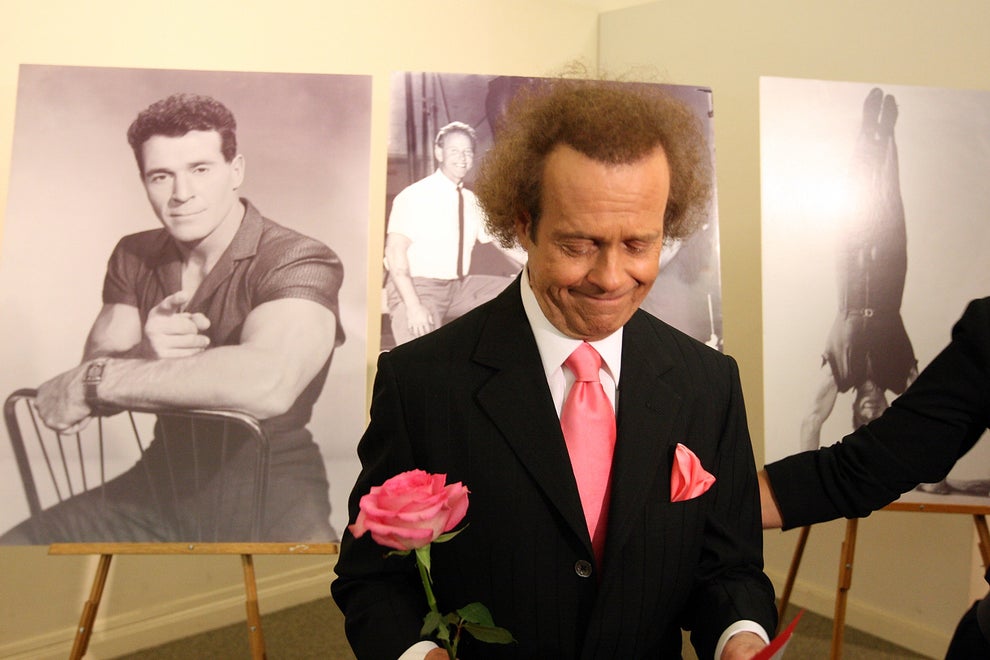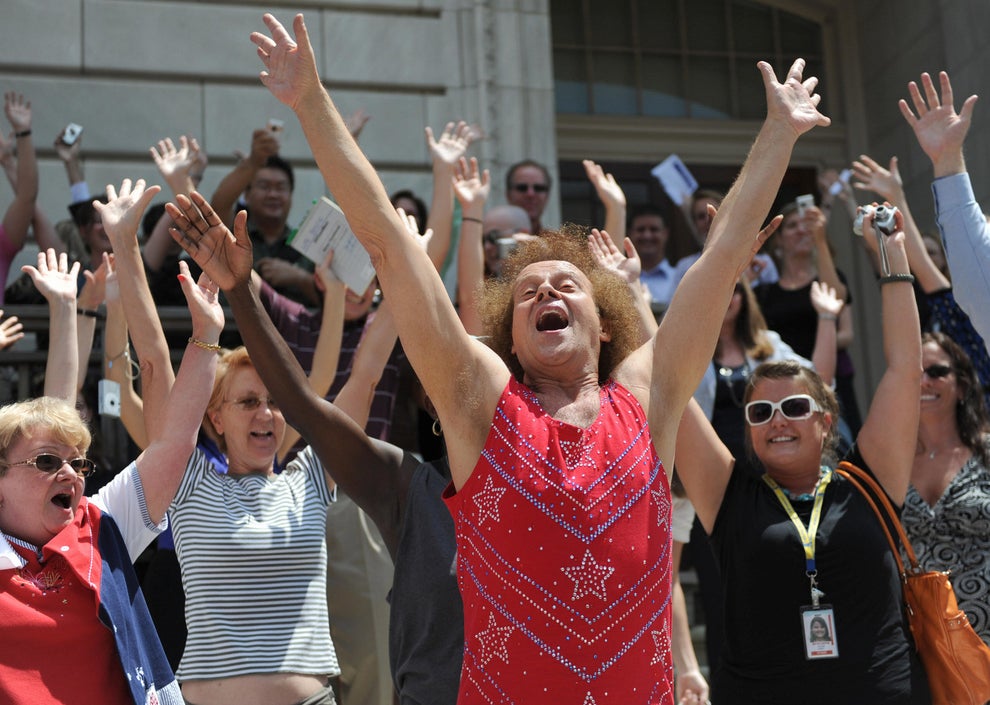
Richard Simmons in October 2013 in New York City. Ilya S. Savenok / Getty Images
The podcast Missing Richard Simmons, created by Simmons’ friend-for-one-year Dan Taberski, was meant, Taberski said in its last episode, to be a “grand gesture” that would draw Simmons out of his three-year self-exile from public life. The 68-year-old exercise guru and formerly ubiquitous talk show personality took himself out of the spotlight in February 2014 without a word of goodbye to many of those close to him. Over the six episodes of his podcast, Taberski sought to solve this mystery and lure Simmons out of hiding, giving particular weight to one theory that Teresa Reveles, Simmons’ housekeeper, has been keeping Simmons hostage.
The tone of Missing Richard Simmons was impish and jaunty, despite its subject matter, which increasingly became about Simmons as a lifelong depressive whose need to be loved had seemingly become too much for him to bear. And it did not succeed in its mission: Simmons never responded to Taberski.
Missing Richard Simmons, which launched on Feb. 15 and concluded this week, was at or near the top of the iTunes and Stitcher podcast charts and was at first frequently compared favorably to Serial (Serial has resulted in a new trial for Adnan Syed, a real-world effect). As it launched and in the weeks after, Taberski, a former Daily Show producer and documentarian, did a number of interviews: with Esquire, The Guardian, and The New York Times, to name a few.
He seems to have stopped doing interviews, though — BuzzFeed News asked twice over two weeks and was told he wasn’t available. It’s probably not a coincidence that backlash against Missing Richard Simmons reached its apex upon the publication of a damning New York Times essay, in which Amanda Hess called it “disturbing,” a “public hounding,” “exploitative,” and “morally suspect” — and “an invasion of privacy masquerading as a love letter.” More criticism has followed: in The Atlantic, NPR, and The New Yorker. Simmons’ longtime publicist and his brother have maintained throughout — both in the press and to the podcast — that Simmons is fine and just wants to be left alone.
Ultimately, the podcast created more questions than it answered. Here are a few of the ones we had about Missing Richard Simmons upon its completion.
1. Several minutes of each episode were devoted to Taberski talking about why he was doing the podcast. One example of many (truly: many): “Look, Richard Simmons should spend his time any way he wants. I really believe that. But all he has to do is say goodbye. Why won’t he give that to people? It’s the easiest thing in the world to do. A one-line email, a two-second phone call, why won’t he give that to them, to David [Garcia, someone who went to Simmons’ exercise studio]? It’s not that it’s wrong, exactly, it’s just confusing. Why would you do that to a friend? Especially a friend whose life you’ve changed.” These justifications for the podcast’s existence really amount to a lot of what is talked about — did Taberski hear himself repeatedly saying these things and think, Maybe this is wrong?
2. Taberski said on the podcast and in interviews that Simmons is “important,” and he wanted to reclaim that legacy on Simmons’ behalf. The whole structure of Missing Richard Simmons could have just been a story about Simmons’ life and legacy, with a very small part of it being that Simmons has dropped out of the world. Instead, Taberski made the search for Simmons the central focus of the podcast. If he had to start over now, knowing what he knows, would he do it the same way?
Simmons speaking at the funeral of fellow fitness guru Jack LaLanne in February 2011 in Los Angeles. David Mcnew / Getty Images
3. In Episode 3, “The Maid and the Masseuse,” Taberski allowed Mauro Oliveira — an artist, Simmons’ former assistant and masseuse, and, Taberski implied, Simmons’ lover — to call Reveles a literal witch, and, though it’s winking, Taberski also called her a witch. (He said: “So let’s recap: Richard’s maid is a witch, and pretty much nothing matters after you call somebody a witch, so let’s start with that.”) He also snidely made fun of Simmons buying Reveles a Mercedes, her taste for Chanel, and the fact that Simmons and Oliveira would cook for her and serve her.
More important, Taberski indulged Oliveira’s kidnapping/hostage fantasy, actively — that Reveles is holding Simmons captive. In Episode 4, after Simmons called the Today show to say he’s fine, Taberski said, “Someone calls to say, ‘Everything’s fine, I’m great!’ and then you cut to the shot that reveals a gun to his head. I’m not saying that’s what’s happening; I’m just saying.”
By the finale, though, Taberski said he wanted to “clear something up about Teresa Reveles,” because of what an LAPD detective had told him. He said: “Based on all this information, I believe Teresa Reveles is just doing her job. Moreover, from what I hear now, she seems to be doing it well.” That’s a huge reversal from calling her a witch (even if he claims to be “skeptical” of that, as he told The Ringer) — and strongly implying that she is a felon. Does Taberski regret that whole subplot?
4. Missing Richard Simmons gave Oliveira a platform to reveal what he thinks are Reveles’ literal crimes. Did Taberski take into account that Reveles might have been trying to keep Simmons away from someone she thought was a hustler? Does he regret relying so much on Oliveira’s theories, as amusing as they may be? And what was the “falling-out” Taberski mentioned, but did not detail, that Simmons had with Oliveira?
5. Episode 5 had concluded with Taberski saying: “I will, in fact, relent. Right after I give it one last shot. Don’t worry, it’s nothing crazy or illegal, it’s just persistent. Loving, but persistent. This time I’m not taking no from your housekeeper for an answer.” And then in the final episode, he mentioned…a boombox. Was he actually going to stand outside of Richard Simmons’ house Say Anything–style?
6. Leading up to the finale, the LAPD did a welfare check on Simmons and Reveles. Taberski finally seemed convinced that Simmons is fine — was it talking to the LAPD detective that changed his mind?
7. In Episode 6, the final installment, it felt like Taberski had perhaps read the criticisms of Missing Richard Simmons. He mentioned that he had scrapped things over the past week, and even in the 24 hours before finalizing it. What were those changes, and why did he make them? How had he pictured the ending beforehand?
Simmons leads Capitol Hill staff and visitors through an exercise routine on July 24, 2004, in Washington, DC. Tim Sloan / AFP / Getty Images
8. In that final episode, Simmons’ manager, Michael Catalano, said to Taberski: “I can’t say that Richard feels better as a result of the podcast. Perhaps you do. I think you really created more worry and speculation.” And he said that Simmons is someone who had the gift of “spending 10 minutes with somebody and they feel like they are his best friend.” Did hearing that from Catalano make Taberski feel that he had unnecessarily caused Simmons worry and attention he doesn’t want, and also that perhaps he hadn’t been as close to Simmons as he’d thought he was?
9. Also in the final episode, Taberski mentioned a chatroom log from April 2014 in which Simmons had said things that were “upsetting: about depression and dark places — things that would make you worried for him.” From the podcast itself, and also just imagining what would make someone disappear from the world, there were so many red flags about Simmons being in a dangerous, debilitating, possibly suicidal depression. How much had Taberski taken that into account? Did he feel that the upbeat, jokey tone of Missing Richard Simmons was ever at odds with what appears to be a very sad story?




